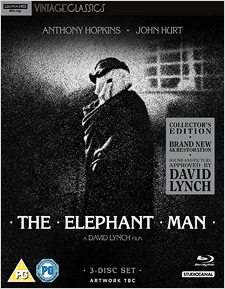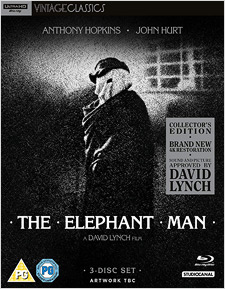Elephant Man, The (UK Import) (4K UHD Review)

Director
David LynchRelease Date(s)
1980 (November 20, 2020)Studio(s)
Brooksfilms/Paramount Pictures (StudioCanal)- Film/Program Grade: A
- Video Grade: A
- Audio Grade: A
- Extras Grade: A
Review
[Editor's Note: This is a UK Import. The Ultra HD disc is Region Free while the two Blu-rays are Region B locked.]
The Elephant Man is the true story of John Merrick (John Hurt), a horribly disfigured man in Victorian England who is rescued from a life as a circus sideshow performer thanks to the efforts of Dr. Frederick Treves (Anthony Hopkins). At first, he’s still treated like a freak even by the hospital staff and even Treves, but eventually most of them come to realize the intelligence and dignity buried beneath his deformed exterior. The Elephant Man was only the second feature directed by David Lynch, and his first time working on someone else’s project—in this case for Brooksfilms, under the aegis of none other than Mel Brooks.
The screenplay was by Christopher De Vore, Eric Bergren, and David Lynch, based on memoirs of Treves and the book by Ashley Montagu. They made an effort to distance themselves from the recent Tony-Award winning play by Bernard Pomerance, even adding at disclaimer at the end: “This has been based upon the true life story of John Merrick, known as The Elephant Man, and not upon the Broadway play of the same title or any other fictional account.” That’s interestingly worded, because while The Elephant Man may not be based on any other fictional accounts, it’s still a work of fiction, altering characters and events to suit the story that they wanted to tell. Yet while some of the details may be inaccurate, the story as a whole does a remarkable job of getting to the central truth of the human condition. Even the most melodramatic moments ring so true that the film works on an emotional level which is unlike anything else in Lynch’s filmography, save perhaps for The Straight Story. Lynch has always been attracted to the grotesque, but it’s not the grotesquery which gives The Elephant Man its power, but rather its humanity.
The Elephant Man was nominated for eight Academy Awards including Best Picture, Best Actor, Best Director, Best Adapted Screenplay, Best Art Direction, Best Costume Design, Best Film Editing, and Best Original Score. Unsurprisingly, it didn’t win a single one. As John Hurt noted, it was Robert DeNiro’s year for Raging Bull—and yet it still wasn’t Martin Scorsese’s year, as top honors went to Ordinary People instead. The only silver lining was that the Academy’s refusal to honor Christopher Tucker’s makeup caused a backlash which resulted in finally creating a category for it the following year. Regardless, it isn’t the awards which make a masterpiece, but rather the filmmakers, and The Elephant Man is a remarkable achievement by any measure.
The Elephant Man was photographed on black-and-white 35 mm film by legendary cinematographer Freddy Francis, using Panavision cameras with Panavision anamorphic lenses, and it was framed at 2.35:1 for its theatrical release. StudioCanal’s transfer comes from 4K scans of the original camera negative, with restoration work by L'Immatine Ritrovata in Italy and color grading by FotoKem in Burbank. The final grading for high dynamic range (which is available here in HDR10 and Dolby Vison) was approved by David Lynch. The level of fine detail is impressive, with facial textures, hair, clothing, and the surrounding environment showing definite improvement over previous versions. The grain generally looks natural, though there are a few shots which seem to exhibit noise as well—for example, in the whitest areas of the screen during the final scene between Hopkins and Hurt, and also during some scenes with smoke or steam. The grayscale is excellent though, and the HDR grade improves the contrast range while allowing for more nuanced detail in the darker portions of scenes. There’s little in the way of visible negative damage, save for perhaps the faintest of scratches for a few brief frames.
Audio is offered in English, German, and French 2.0 DTS-HD Master Audio, with optional English SDH, German, and French subtitles. The Elephant Man was originally released in Dolby Stereo, so it’s a matrix encoded four-channel mix. This version of the soundtrack was restored by StudioCanal using the original magnetic printmaster as a source. The creative sound design by Lynch and Alan Splet is similar to what they did for Eraserhead, but expanded into the wider palette offered by the Dolby matrix. There’s constant surround ambience throughout the film, like the crowds and other noises in the opening carnival scene, or rain and thunder effects later on. There’s also a low industrial drone in most of the cityscapes which is very reminiscent of the similar soundscapes in Eraserhead—Lynch and Splet doubtless dipped into their catalogue of effects from that film. The bass is deep when it needs to be, the dialogue is clear, and the music by John Morris sounds great.
StudioCanal’s Ultra HD release is a 3-disc set which includes a Blu-ray copy of the film with the same extras as the UHD, as well as another Blu-ray with more extras (both are Region B locked). All of the extras are in HD, though the interviews with Lynch and Hurt, as well as the rest of the extras on Disc Three, are all upscaled from SD from higher quality source formats.
DISCS ONE & TWO: FILM (UHD & BD)
- Photographing The Elephant Man (25:15)
- BFI Q&A with Jonathan Sanger (24:21)
DISC THREE: EXTRAS (BD)
- Interview with David Lynch (24:49)
- Interview with John Hurt (20:14)
- The Air is on Fire: Interview with David Lynch at Cartier Foundation (14:50)
- Joseph Merrick: The Real Elephant Man (19:53)
- Behind the Scenes Still Gallery
- Mike Figgis Interviews David Lynch (19:47)
- The Terrible Elephant Man Revealed (30:02)
Photographing The Elephant Man is an interview with still photographer Frank Connor, who worked behind the scenes on The Elephant Man. He talks about how he got into the business, his experiences on the set, and why he didn’t shoot any color stills for this production. The BFI Q&A is a question-and-answer session with producer Jonathan Sanger after a screening of the film for a John Hurt retrospective at the BFI Southbank in 2018. He tells the story about how he discovered the script thanks to his babysitter, and also talks about how Lynch became involved with the production, especially the uncomfortable experience of having to show Eraserhead to Mel Brooks. He also covers his experiences with the makeup, and explains the reasons why they shot the film in black-and-white.
The interview with David Lynch includes how he became involved with The Elephant Man after his failure to raise money for Ronnie Rocket, his working relationship with Mel Brooks, his involvement with rewriting the script, the cast and crew, the way that Merrick was depicted, the look of the film, and the reactions to it after its release. Lynch also gives his reasons for turning his back on celluloid, and why he prefers to shoot digitally. The interview with John Hurt covers the design of the character, why he prefers to stick to the script and avoid improvisation, his experiences with the other actors in the film, the difficulties of the shoot, the Oscar campaign, and his own feelings about the meaning of the film. The Air is on Fire is a look at an exhibition of Lynch’s artwork and short films at the Cartier Foundation in Paris in 2007, with author and composer Michael Chion meeting Lynch for the first time. None of it relates to the film, but it’s a rare example of Lynch actually interpreting his own art. Joseph Merrick: The Real Elephant Man is an interview with Jonathan Evans, archivist at the Royal London Hospital Museum. He examines how the film compares to what is known about Joseph Merrick, including the historical context in which he lived. Evans calls the film an interpretation of the real story, and notes the many changes in both the details and the chronology. For example, it was Merrick himself who had first approached the circus sideshow as a way to make money. Evans also talks about the mystery of Merrick’s death. Mike Figgis Interviews David Lynch is another feature which doesn’t relate directly to The Elephant Man, but it does provide a look at Lynch describing his own creative process. Figgis shot the interview himself in a bare hotel hallway with a single light bulb between them, and Lynch appears to respond well to the quirky setting—he even shows his admiration for the bulb. The Terrible Elephant Man Revealed is a documentary about the making of the film, featuring interviews with Jonathan Sanger, Mel Brooks, John Hurt, Freddie Francis, and Christopher Tucker. It covers the development of the film, the script, Lynch’s participation, the cast, the makeup, and the shutout at the Academy Awards. While brief, it provides a nice overview of the history of the production, and it’s probably the best extra to watch first.
The Elephant Man is a fascinating example of how an independent filmmaker like Lynch could make a personal statement within the bounds of a mainstream production, despite essentially being a director for hire. But thanks to his disastrous experiences making his next feature Dune, Lynch never relinquished his independence again, and as a result the rest of his career has gone very much his own way. That’s not a bad thing. Still, The Elephant Man shows just what he could accomplish as a relatively commercial director as long as he had a supportive production company behind him, and it’s a worthy addition to his filmography.
- Stephen Bjork
(You can follow Stephen on Facebook at this link)

